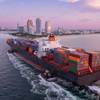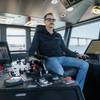Navis Survey Acclaims AI
Global container terminals are expected to embrace automated decision making powered by artificial intelligence (AI) as they pursue ways to improve operational consistencies and enhance equipment utilization.
According to TechValidate customer survey by Navis, 88% of respondents indicated that automated decision making will be very if not extremely important for the future of innovation at terminals.
Further, 83% plan to increase their AI investments over the next one-to-three years, signaling growing confidence in the use of innovative technologies to improve terminal efficiencies and gain competitive advantages, said the survey.
Nearly 60 Navis customers participated in the survey, representing a cross-section of container terminals around the world using various degrees of automation and AI to improve operations.
The survey asked Navis customers what they perceive as the most important benefits of automated decision-making. Improved consistency of operations and equipment utilization (86% each), both topped the list, followed by enabling teams to work smarter and faster (60%), improved safety (47%), better management of billable events (33%) and improved environmental compliance (12%).
Lastly, more than one third (39%) of respondents noted that automated decision-making could increase terminal productivity by as much as five-to-six moves per hour. A small percentage (2%) even believed productivity gains could be twice that rate—more than 10 moves per hour.
The survey findings indicate that container terminals, regardless of AI maturity, are increasingly aware of the possibilities of automated decision-making. According to respondents, container handling equipment (CHE) assignments (81%), decking (81%), action recommendations (69%), gate volume predictions (59%) and vessel stowage (52%) are among the many decisions customers believe could be automated with the help of AI.
“Just a few short years ago only a handful of our customers were even open to the idea of automation or other disruptive technologies designed to make the container terminal smarter, safer and more sustainable,” said Andy Barrons, Chief Strategy Officer, Navis.
“The survey demonstrates just how far the industry has come – and will continue to go – in harnessing technology in the right ways to automate decision making within terminals. We firmly believe that automation and the use of AI is our future, and will continue to support our current and future customers as they embark down this critical path,” he added.
Despite its potential, AI-driven automated decision-making continues to be an uphill battle for some. When asked to indicate their current phases of AI implementation, no one reported deploying a high level of AI within their operations. More than half (56%) reported being in learning or piloting phases while 11% noted having deployed some AI into terminal operations.
When asked to identify the biggest challenges to achieving the benefits of AI, respondents noted a lack of AI technology skills (68%), data quality (57%), relevant industry use cases with business outcomes (34%) and data availability (30%) among the top reasons.
Navis is a part of Cargotec Corporation and provider of operational technologies and services that unlock greater performance and efficiency for the world’s leading terminal operators.













